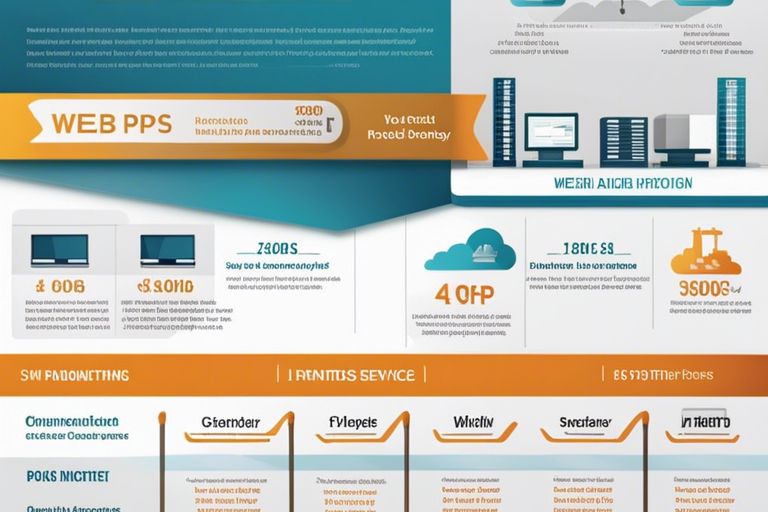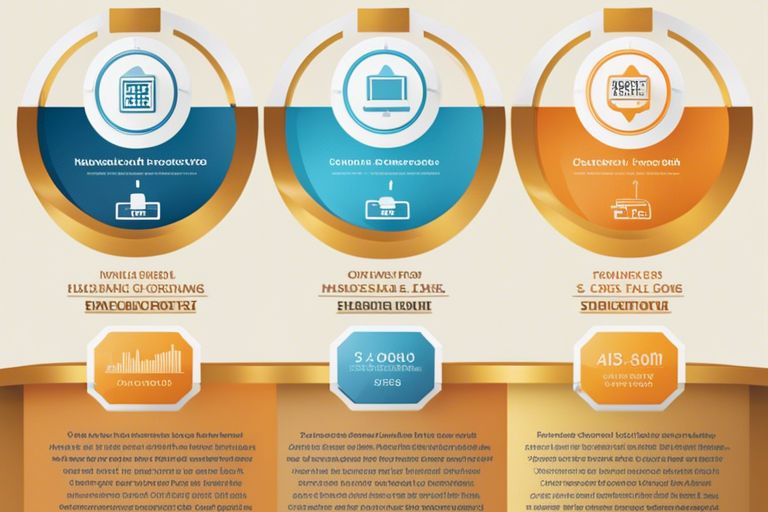Key Takeaways:
- Web hosting is crucial for any website: Understanding the different types of web hosting is crucial for launching a successful website.
- Shared hosting is cost-effective but has limitations: While shared hosting is affordable, it may lead to slower loading times and security risks due to sharing resources with other websites.
- Dedicated servers provide the highest level of control: If you require full control over your server and expect high traffic volumes, dedicated hosting is the ideal choice, though it comes at a higher cost.
Exploring Types of Web Hosting
Clearly, understanding the different types of web hosting services is crucial for anyone looking to establish a strong online presence. From shared hosting to cloud hosting, each type offers unique features and benefits that cater to different website needs. Knowing the distinctions between these hosting options will help you make an informed decision about which one is right for your website.
| Shared Hosting | Virtual Private Server (VPS) Hosting |
| Dedicated Server Hosting | Cloud Hosting |
| Managed Hosting |
– Shared Hosting
An affordable option for beginners, shared hosting involves multiple websites sharing a single server. This type of hosting is suitable for small websites with low to moderate traffic. With shared hosting, the hosting provider manages the server, making it a hassle-free option for those new to website hosting.
Shared hosting is cost-effective and easy to set up, making it a popular choice for individuals and small businesses looking to establish an online presence. However, since resources are shared among multiple websites, performance may be affected during peak traffic periods.
We also advise you to take a closer look at Bluehost hosting, which is one of the most popular hosting currently
– Virtual Private Server (VPS) Hosting
Private Virtual Server Hosting, or VPS hosting, offers a more customizable and scalable solution compared to shared hosting. In this setup, websites are hosted on a virtual server that mimics a dedicated server environment. The VPS hosting environment provides more control over server settings and resources.
The flexibility of VPS hosting allows for easy scalability, making it ideal for websites that anticipate growth in traffic and resources. The isolated nature of VPS hosting ensures that one user’s activities do not affect the performance of others on the server, providing a more stable hosting environment.
The additional privacy and control provided by VPS hosting make it a preferred choice for businesses and individuals with specific hosting requirements. With VPS hosting, users can customize server settings, install software, and allocate resources as needed to meet their unique website needs.
– Dedicated Server Hosting
Hosting your website on a dedicated server means you have exclusive access to all server resources. This type of hosting offers maximum performance, security, and control, making it the preferred choice for large websites with high traffic volumes or resource-intensive applications.
To ensure optimal performance, dedicated server hosting requires technical expertise to manage server configurations, security updates, and software installations. This hosting option is best suited for websites that require dedicated resources and demand high levels of customization.
– Cloud Hosting
Started
A scalable and reliable hosting solution, cloud hosting utilizes a network of virtual servers to distribute resources and handle load spikes efficiently. This type of hosting offers flexibility and cost-effective scalability, allowing websites to easily adjust resources based on traffic fluctuations.
A cloud hosting environment is highly resilient and redundant, minimizing downtime and ensuring optimal performance for websites. This type of hosting is ideal for websites that experience fluctuating traffic levels or require on-demand resource allocation.
– Managed Hosting
Shared
Scenarios
Factors to Consider When Choosing Web Hosting
Now that you have decided to launch a website, one of the most crucial decisions you’ll make is choosing the right web hosting service. With a plethora of options available, it can be overwhelming to determine which hosting provider is best suited for your website’s needs. To help you make an informed choice, here are some key factors to consider:
– Understanding Your Website’s Needs
Your website’s requirements play a significant role in selecting the appropriate web hosting plan. Consider factors such as the type of website you are running, its expected traffic volume, and any specific features or applications it may require. For instance, an e-commerce site with high traffic will need a robust hosting solution compared to a personal blog.
It’s necessary to assess your current website needs and anticipate future growth. Scalability is crucial, as you’ll want a hosting provider that can accommodate your website’s growth without experiencing downtime or performance issues. By understanding your website’s needs, you can narrow down your options and choose a hosting plan that aligns with your requirements.
– Evaluating Web Hosting Features
Hosting providers offer a variety of features that can enhance the performance and security of your website. When evaluating web hosting features, consider aspects such as uptime guarantee, server speed, storage space, bandwidth limits, and customer support availability. These features can have a significant impact on your website’s user experience and overall success.
This section of your research should also include looking into the hosting provider’s security measures, backup options, and scalability features. Understanding how these features align with your website’s needs can help you make an informed decision and ensure that your website remains secure and accessible to users.

Practical Tips for Web Hosting
Many factors contribute to a successful web hosting experience. Whether you are just starting or looking to improve your current setup, these practical tips can help you make informed decisions.
- Choose a reputable web hosting provider with a strong track record of uptime and customer support.
- Consider your website’s requirements and select a hosting plan that aligns with your needs.
- Regularly backup your website data to prevent data loss in case of emergencies.
- Optimize your website for speed and performance to enhance user experience and SEO rankings.
Any decisions regarding web hosting should be based on thorough research and consideration to ensure optimal performance and security for your website.
– Step-by-Step Guide to Migrating Your Website
The migration process can seem daunting, but with a structured approach, you can smoothly transfer your website to a new hosting provider.
| Step1 | Backup your current website files and databases. |
| Step2 | Set up your new hosting account and upload your website files. |
| Step3 | Update your domain’s DNS settings to point to the new hosting server. |
| Step4 | Test your website thoroughly to ensure everything is functioning correctly. |
The smooth execution of each step is crucial to prevent any disruptions to your website’s availability and performance.
– Security Best Practices for Every Type of Hosting
Security is a top priority for any website owner, regardless of the type of hosting service they use. Implementing best practices can help safeguard your website from potential threats and attacks.
Step-by-step, ensure your website is protected by using SSL certificates, keeping software up to date, using strong passwords, and regularly monitoring for any security vulnerabilities.
Navigating the Pros and Cons
For those delving into the world of web hosting, understanding the pros and cons of each type is crucial in making an informed decision. To help you navigate through the options, here is a breakdown of the advantages and disadvantages of different types of web hosting:
| Shared Hosting | Dedicated Hosting |
| Low cost | High performance |
| Easy to set up | Full control over server |
| Good for small websites | Scalable for high traffic |
| Limited resources | Higher cost |
– Comparing Long Term Costs and Benefits
For those looking at the bigger picture, comparing the long-term costs and benefits of different web hosting options is crucial in determining the most cost-effective solution. Here is a breakdown of the long-term costs and benefits of shared hosting versus dedicated hosting:
| Shared Hosting | Dedicated Hosting |
| Lower initial cost | Higher initial cost |
| Limited scalability | Greater scalability |
| Shared resources | Dedicated resources |
– Mitigating Common Hosting Challenges
For those navigating the challenges that come with web hosting, there are strategies to mitigate common issues. By understanding these challenges and how to address them, you can ensure a smoother hosting experience.
The key to mitigating common hosting challenges lies in regular monitoring of your website’s performance, implementing security measures, and keeping software up to date. By staying proactive and addressing issues promptly, you can minimize downtime and ensure a reliable hosting environment for your website.
– To wrap up
As a reminder, understanding the different types of web hosting is crucial for anyone looking to create a website. Whether you opt for shared hosting, VPS hosting, dedicated hosting, or cloud hosting, each type has its own set of benefits and limitations. By familiarizing yourself with these options, you will be better equipped to make an informed decision that meets your website’s specific needs. Remember to consider factors such as budget, traffic volume, security, and technical knowledge when choosing the right web hosting solution for your website. With this guide, you now have the knowledge to navigate the world of web hosting confidently and effectively.
FAQ
Q: What is shared hosting?
A: Shared hosting is a type of web hosting where multiple websites are hosted on a single physical server. This means that resources such as CPU, memory, and disk space are shared among all the websites on that server. It is an economical option for beginners and small businesses with low to moderate traffic.
Q: What is VPS hosting?
A: VPS hosting, or Virtual Private Server hosting, is a type of web hosting that uses virtualization technology to provide each website with its own dedicated resources on a shared server. This means that you have more control and flexibility compared to shared hosting. VPS hosting is suitable for websites with moderate to high traffic volumes.
Q: What is dedicated hosting?
A: Dedicated hosting is a type of web hosting where an entire physical server is dedicated to a single website or customer. This means that you have full control over the server, including the choice of operating system, hardware, and software. Dedicated hosting is suitable for websites with very high traffic volumes and resource requirements.
**********************************



